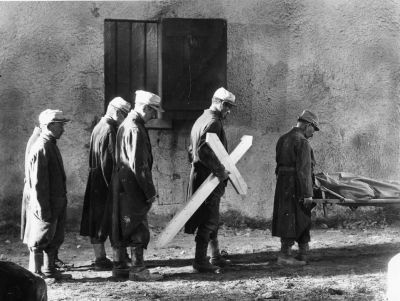
LES CROIX DE BOIS
(Wooden Crosses, Francia/1931) R.: Raymond Bernard. D.: 115'. V. francese. Digitale
T. int.: Wooden Crosses Sog.: dal romanzo omonimo di Roland Dorgelès. Scen.: Raymond Bernard, André Lang. F.: Jules Krüger. M.: Lucienne Grumberg. Scgf.: Jean Perrier. Int.: Raymond Aimos (Fouillard), Antonin Artaud (Vieublé), Charles Vanel (caporale Breval), Gabriel Gabrio (Sulphart), Paul Azaïs (Broucke), Pierre Blanchar (Gilbert Demachy). Prod.: Pathé-Natan DCP. D.: 115'. Bn. Versione francese con sottotitoli inglesi / French version with English subtitles
Da: Pathé International Restaurato da Pathé e Fondation Jérôme Seydoux-Pathé. Il film è stato scansionato e restaurato in 4K presso il laboratorio L'Immagine Ritrovata / Restored by Pathé and Fondation Jérôme Seydoux-Pathé. The film was scanned and restored in 4K at L'Immagine Ritrovata laboratory.
Introduce Sophie Seydoux (Fondation Jérôme Seydoux Pathé)
Les Croix de bois è uno dei film più sottovalutati del cinema francese degli anni Trenta, e tuttavia va annoverato nella storia del cinema tra le più terrificanti evocazioni del grande mattatoio del '14-'18. Costruzione e regia sono caratterizzate da un rigore sorprendente, quasi documentario, nel descrivere l'inesorabile disgregazione e la morte di un drappello di soldati francesi. Laddove Milestone e Pabst sottolineano il loro intento pacifista, Bernard rifugge da ogni discorso retorico, confidando totalmente nel peso terribile delle immagini di Jules Krüger. Una sobrietà che alcuni rimproverarono all'epoca ma che oggi rivela tutta la sua modernità, assieme al rifiuto del pathos e del melodramma bellico. Il film ebbe un successo immediato, eppure la sua risonanza internazionale fu presto ostacolata, prima dall'ascesa dei nazisti (che lo vietarono subito) e poi da Hollywood, che gli riservò una ben strana sorte: acquistato da Fox Film già nel 1932, non verrà mai distribuito, ma saccheggiato negli anni per fornire stock-shots alle produzioni di Darryl F. Zanuck. Sì, è proprio Pierre Blanchar che vediamo lanciar granate tra due inquadrature in teatro di posa di Fredric March e Werner Baxter in Le vie della gloria (1936) di Howard Hawks!
Lenny Borger, Les Croix de bois, "Cinématographe", n. 91, luglio 1983
Les Croix de bois is one of the most underrated films in French cinema from the Thirties which should nevertheless be included in the history of cinema among the most terrifying portrayals of the World War I. The structure and direction are surprisingly rigorous, almost documentary-like, in describing the relentless disintegration and the death of a squadron of French soldiers. Whilst Milestone and Pabst highlight their pacifism, Bernard avoids rhetoric, entrusting himself completely to the impact of Jules Krüger's cinematography. Its simplicity was criticised by some at the time but now shows its modernity, together with the rejection of pathos and military melodrama. The film was an immediate success, and yet international recognition was thwarted, first of all, by the Nazis (who banned it immediately) and then Hollywood, where it had a strange fate: it was bought by Fox as early as 1932, it would never be distributed but parts of it would be used for stock-shots by Darryl F. Zanuck's production. Yes, it really is Pierre Blanchar that you can see hurling grenades between two studio frames of Fredric March and Werner Baxter in The Road to Glory (1936) by Howard Hawks!
Lenny Borger, Les Croix de bois, "Cinématographe", no. 91, July 1983

Tariffe:
Aria condizionata
Accesso disabili
Tel. 051 522285











